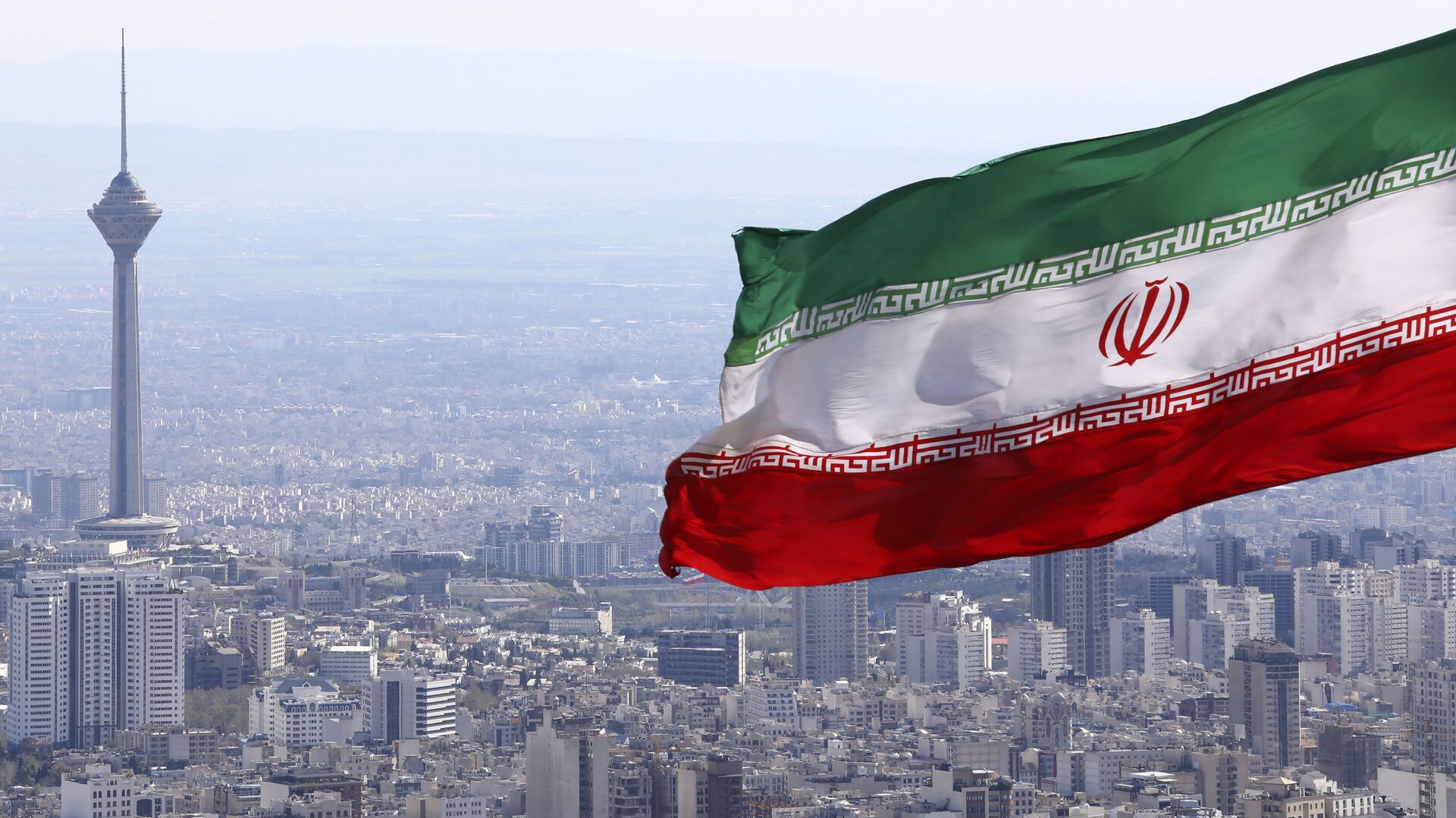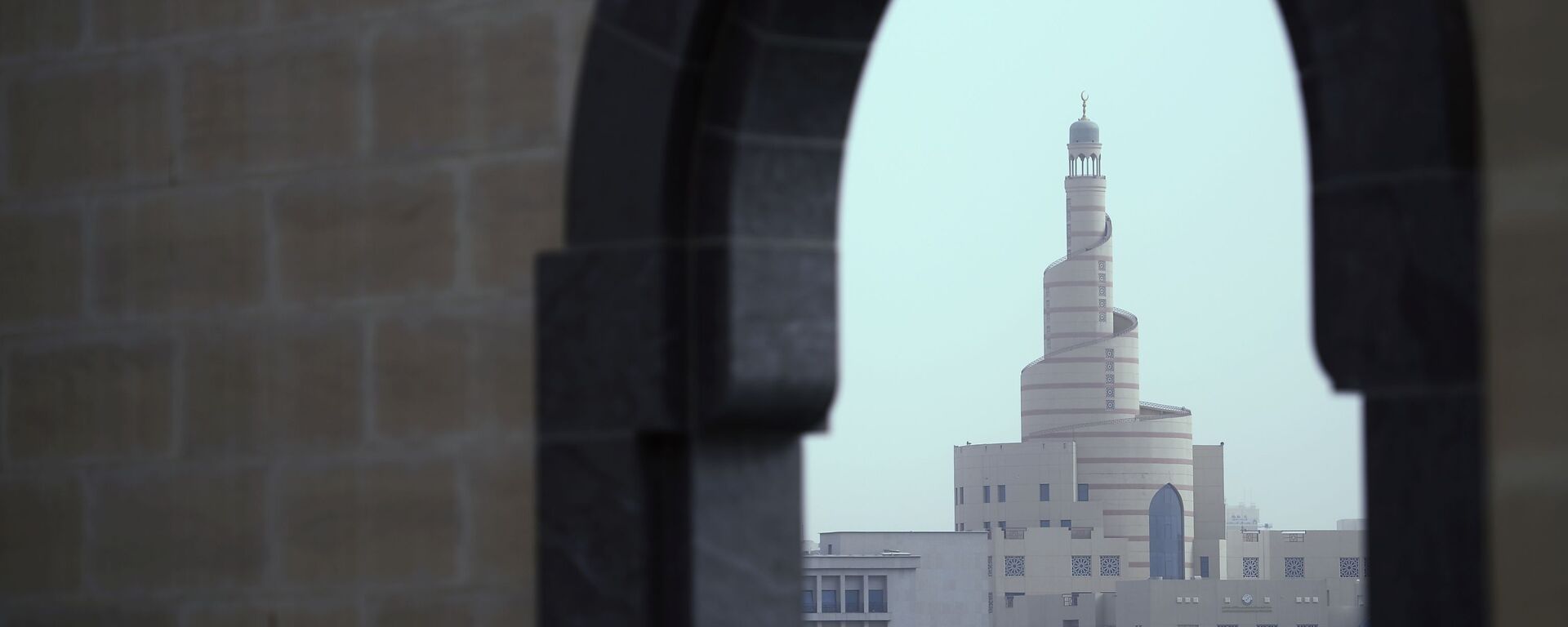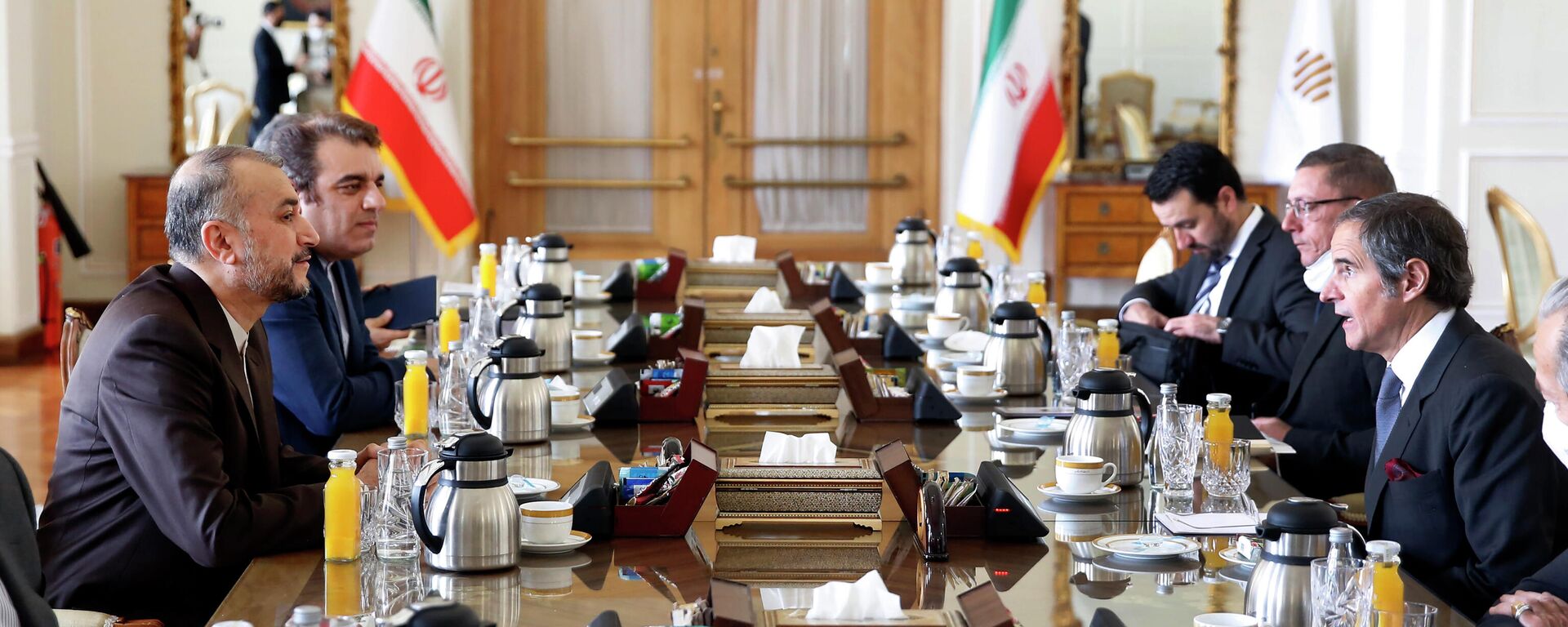https://sputnikglobe.com/20220706/mutually-exclusive-nuclear-deal-wont-be-restored-if-us-sticks-to-unilateral-demands-iran-says-1097024032.html
‘Mutually Exclusive’: Nuclear Deal Won’t Be Restored If US Sticks to Unilateral Demands, Iran Says
‘Mutually Exclusive’: Nuclear Deal Won’t Be Restored If US Sticks to Unilateral Demands, Iran Says
Sputnik International
Negotiations on the possible restoration of the Joint Comprehensive Plan of Action (JCPOA) nuclear agreement have dragged on for well over a year since... 06.07.2022, Sputnik International
2022-07-06T16:09+0000
2022-07-06T16:09+0000
2022-07-06T16:09+0000
iran
hossein amir abdollahian
josep borrell
joint comprehensive plan of action (jcpoa)
nuclear deal
https://cdn1.img.sputnikglobe.com/img/07e4/0b/0e/1081163985_0:71:3318:1937_1920x0_80_0_0_3172d4937f25c802f5ba69da643f7fb8.jpg
There will be no agreement on Iran nuclear deal if the US sticks to its “unilateral demands,” Iranian Foreign Minister Hossein Amir-Abdollahian has indicated.“Had a call with [EU foreign policy chief] Josep Borrell earlier tonight. Agreement is possible only based on mutual understanding and interests. We remain ready to negotiate a strong and durable agreement. US must decide if it wants a deal or insists on sticking to its unilateral demands. Mutually exclusive,” Amir-Abdollahian tweeted late Tuesday.Earlier in the day, Borrell himself took to Twitter to warn Tehran that “if we want to conclude an agreement, decisions are needed now,” and that “the political space to revive the JCPOA may narrow soon.”The Iranian foreign minister did not elaborate on the US’s “unilateral demands.” However, in past talks, Washington has sought to tie the lifting of sanctions to Iran’s return to compliance with the uranium enrichment and stockpiling limitations outlined in the JCPOA. Tehran has rejected these demands, stressing that as the party which unilaterally walked out on the nuclear deal in 2018, it’s up to the US side show good will by lifting sanctions. More recently, Tehran has also required that Washington lift its “terrorism” designation against the Islamic Revolutionary Guard Corps, and asked for guarantees that the Islamic Republic will benefit economically from returning to the nuclear agreement.In a related development, Amir-Abdollahian met with Qatari Foreign Minister Sheikh Mohammed bin Abdulrahman Al Thani in Tehran on Wednesday amid Doha’s efforts to break the ongoing deadlock in the nuclear negotiations.“Contrary to media claims of the American side, we have put forward no excessive demand that goes beyond the framework of the JCPOA,” Amir-Abdollahian said at a press conference. Iran, he said, is looking for a “good, strong and lasting agreement,” and its requirement of assurances that the country will benefit from a return to the pact is “not excessive.”The foreign minister’s comments followed claims by Biden special envoy for Iran Robert Malley Tuesday that Tehran’s “new demands” at recent talks hosted by Doha have “nothing to do with the nuclear deal.”These sentiments were echoed by State Department spokesman Ned Price, who alleged that Iran has “consistently introduced extraneous demands, demands that – or issues that – go beyond the four walls of the JCPOA.”“The JCPOA is about one thing, it’s about one thing only, and that’s Iran’s nuclear program. To introduce anything that goes beyond the narrow confines of the JCPOA suggests a lack of seriousness, suggests a lack of commitment. And that, unfortunately, is what the team saw once again in Doha,” Price said at a press conference Tuesday, adding that Washington was “disappointed” in Tehran’s behavior.The US and its allies have themselves been accused by Iran of trying to tack additional demands onto a renewed JCPOA, including limitations on the Islamic Republic’s conventional missile programs or even constraints on Tehran’s freedom of action in formulating its regional policy. The Islamic Republic has rejected these demands out of hand.Iran, the US, Russia, China, France, Germany, Britain and the European Union have been holding talks on the JCPOA’s restoration for more than a year, with Joe Biden pledging a US return to the nuclear agreement during the 2020 presidential campaign. The talks have made little headway in recent months, with Biden’s hands tied at least in part by Israel’s opposition to the nuclear agreement, and repeated warnings from Tel Aviv that it will not be bound by any deal. Israel reserves itself the right to attack Iran’s nuclear facilities, and has lobbied the Trump administration extensively before the US’s 2018 pullout from the JCPOA. Biden is expected to visit Israel during his upcoming Middle East tour later this month.
https://sputnikglobe.com/20220630/uk-france-germany-say-iran-has-made-unrealistic-demands-at-doha-meeting-on-jcpoa-1096840880.html
https://sputnikglobe.com/20220629/jcpoa-talks-between-iran-us-in-qatar-unsuccessful-reports-say-1096804832.html
iran
Sputnik International
feedback@sputniknews.com
+74956456601
MIA „Rossiya Segodnya“
2022
News
en_EN
Sputnik International
feedback@sputniknews.com
+74956456601
MIA „Rossiya Segodnya“
Sputnik International
feedback@sputniknews.com
+74956456601
MIA „Rossiya Segodnya“
iran, hossein amir abdollahian, josep borrell, joint comprehensive plan of action (jcpoa), nuclear deal
iran, hossein amir abdollahian, josep borrell, joint comprehensive plan of action (jcpoa), nuclear deal
‘Mutually Exclusive’: Nuclear Deal Won’t Be Restored If US Sticks to Unilateral Demands, Iran Says
Negotiations on the possible restoration of the Joint Comprehensive Plan of Action (JCPOA) nuclear agreement have dragged on for well over a year since President Joe Biden first announced his intention to return the US to the landmark 2015 agreement.
There will be no agreement on Iran nuclear deal if the US sticks to its “unilateral demands,” Iranian Foreign Minister Hossein Amir-Abdollahian has indicated.
“Had a call with [EU foreign policy chief] Josep Borrell earlier tonight. Agreement is possible only based on mutual understanding and interests. We remain ready to negotiate a strong and durable agreement. US must decide if it wants a deal or insists on sticking to its unilateral demands. Mutually exclusive,” Amir-Abdollahian tweeted late Tuesday.
Earlier in the day, Borrell himself took to Twitter to warn Tehran that “if we want to conclude an agreement, decisions are needed now,” and that “the political space to revive the JCPOA may narrow soon.”
The Iranian foreign minister did not elaborate on the US’s “unilateral demands.” However, in past talks, Washington has sought to tie the lifting of sanctions to Iran’s return to compliance with the uranium enrichment and stockpiling limitations outlined in the JCPOA. Tehran has rejected these demands, stressing that as the party which unilaterally walked out on the nuclear deal in 2018, it’s up to the US side show good will by lifting sanctions. More recently, Tehran has also required that Washington lift its “terrorism” designation against the Islamic Revolutionary Guard Corps, and asked for guarantees that the Islamic Republic will benefit economically from returning to the nuclear agreement.
In a related development, Amir-Abdollahian met with Qatari Foreign Minister Sheikh Mohammed bin Abdulrahman Al Thani in Tehran on Wednesday amid Doha’s efforts to break the ongoing deadlock in the nuclear negotiations.
“Contrary to media claims of the American side, we have put forward no excessive demand that goes beyond the framework of the JCPOA,” Amir-Abdollahian
said at a press conference. Iran, he said, is looking for a “good, strong and lasting agreement,” and its requirement of assurances that the country will benefit from a return to the pact is “not excessive.”
The foreign minister’s comments followed
claims by Biden special envoy for Iran Robert Malley Tuesday that Tehran’s “new demands” at recent talks hosted by Doha have “nothing to do with the nuclear deal.”
These sentiments were echoed by State Department spokesman Ned Price, who alleged that Iran has “consistently introduced extraneous demands, demands that – or issues that – go beyond the four walls of the JCPOA.”
“The JCPOA is about one thing, it’s about one thing only, and that’s Iran’s nuclear program. To introduce anything that goes beyond the narrow confines of the JCPOA suggests a lack of seriousness, suggests a lack of commitment. And that, unfortunately, is what the team saw once again in Doha,” Price
said at a press conference Tuesday, adding that Washington was “disappointed” in Tehran’s behavior.
The US and its allies have themselves been accused by Iran of trying to tack additional demands onto a renewed JCPOA, including limitations on the Islamic Republic’s conventional missile programs or even constraints on Tehran’s freedom of action in formulating its regional policy. The Islamic Republic has rejected these demands out of hand.
Iran, the US, Russia, China, France, Germany, Britain and the European Union have been holding talks on the JCPOA’s restoration for more than a year, with Joe Biden pledging a US return to the nuclear agreement during the 2020 presidential campaign. The talks have made little headway in recent months, with Biden’s hands tied at least in part by Israel’s opposition to the nuclear agreement, and repeated warnings from Tel Aviv that it will
not be bound by any deal. Israel reserves itself the right to attack Iran’s nuclear facilities, and has lobbied the Trump administration extensively before the US’s 2018 pullout from the JCPOA. Biden is expected to visit Israel during his upcoming Middle East tour later this month.



